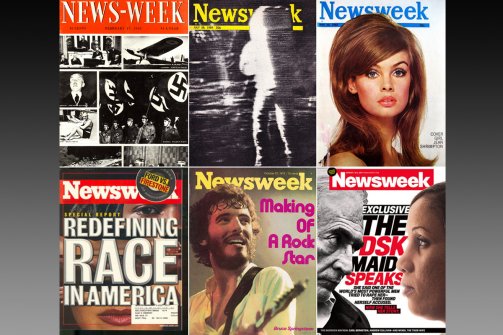The End Of Print: Newsweek’s Selfish Statement
Newsweek editor-in-chief Tina Brown and CEO Baba Shetty made a big announcement earlier this morning.
After 80 years as a weekly print magazine, they wrote, Newsweek plans to end its print edition in December and continue on only in a digital format.
But I noticed one GIANT omission in their statement. The entire statement is below. See if you can spot the omission.

After 80 years in print, the newsmagazine adopts an all-digital format.We are announcing this morning an important development at Newsweek and The Daily Beast. Newsweek will transition to an all-digital format in early 2013. As part of this transition, the last print edition in the United States will be our Dec. 31 issue.
Meanwhile, Newsweek will expand its rapidly growing tablet and online presence, as well as its successful global partnerships and events business.
Newsweek Global, as the all-digital publication will be named, will be a single, worldwide edition targeted for a highly mobile, opinion-leading audience who want to learn about world events in a sophisticated context. Newsweek Global will be supported by paid subscription and will be available through e-readers for both tablet and the Web, with select content available on The Daily Beast.
Four years ago we launched The Daily Beast. Two years later, we merged our business with the iconic Newsweek magazine—which The Washington Post Company had sold to Dr. Sidney Harman. Since the merger, both The Daily Beast and Newsweek have continued to post and publish distinctive journalism and have demonstrated explosive online growth in the process. The Daily Beast now attracts more than 15 million unique visitors a month, a 70 percent increase in the past year alone—a healthy portion of this traffic generated each week by Newsweek’s strong original journalism.
At the same time, our business has been increasingly affected by the challenging print advertising environment, while Newsweek’s online and e-reader content has built a rapidly growing audience through the Apple, Kindle, Zinio and Nook stores as well as on The Daily Beast. Tablet-use has grown rapidly among our readers and with it the opportunity to sustain editorial excellence through swift, easy digital distribution—a superb global platform for our award-winning journalism. By year’s end, tablet users in the United States alone are expected to exceed 70 million, up from 13 million just two years ago.
Currently, 39 percent of Americans say they get their news from an online source, according to a Pew Research Center study released last month. In our judgment, we have reached a tipping point at which we can most efficiently and effectively reach our readers in all-digital format. This was not the case just two years ago. It will increasingly be the case in the years ahead.
It is important that we underscore what this digital transition means and, as importantly, what it does not. We are transitioning Newsweek, not saying goodbye to it. We remain committed to Newsweek and to the journalism that it represents. This decision is not about the quality of the brand or the journalism—that is as powerful as ever. It is about the challenging economics of print publishing and distribution.
Newsweek is produced by a gifted and tireless team of professionals who have been offering brilliant work consistently throughout a tough period of ownership transition and media disruption. Regrettably we anticipate staff reductions and the streamlining of our editorial and business operations both here in the U.S. and internationally.
Exiting print is an extremely difficult moment for all of us who love the romance of print and the unique weekly camaraderie of those hectic hours before the close on Friday night. But as we head for the 80th anniversary of Newsweek next year we must sustain the journalism that gives the magazine its purpose—and embrace the all-digital future.

In reading this statement, I couldn’t help thinking of the 60-year-old man who has dutifully paid his subscription bill for the past three decades and who looked forward each week to the print edition. Or the 80-year-old woman who has subscribed for the past 12 years, and who will not have a good option to read Newsweek’s digital version.
This statement didn’t express one iota of care and concern for the readers who built the Newsweek brand.
Even worse, when the statement addressed the difficulty of their decision to exit print, it was all about them, not their readers:
“Exiting print is an extremely difficult moment for all of us who love the romance of print and the unique weekly camaraderie of those hectic hours before the close on Friday night.”
Do you really think that 60-year-old man or that 80-year-old woman cares about the difficulty for the editors who “love the romance of print and the unique weekly camaraderie?” Heck no. They care about the loss of their own cherished weekly tradition, as well they should.
I know that Newsweek didn’t explicitly say, “We don’t care about our current readers.”
On second thought, they kind of did.
If you enjoyed this article, would you please help me reach a larger audience by sharing it with your social networks? Share buttons are below. Thank you!



[…] got the point across. Good job. However, Brad Phillips (aka Mr. Media Training) noticed something missing from the statement—something we think is extremely […]
I agree — it’s almost all about them. It touts its 15 million online visitors but spends too much time describing how this transition will save a sinking ship. What’s it in for the reader? We used to like the feel of a print publication in our hands, too, but I guess that’s just being sentimental.
Another spot-on article. You continue to be my go-to guy when it comes to analyzing and guiding the discussion about our industry. This is a must read for any brand that gives half a spit about its customers. Thank you. I wonder when Newsweek fails completely whether anyone will remember the decisions that Ms. Brown made that caused it.
Roger,
Thank you very much for those kind words and for continuing to read the blog. I’m delighted that you find this blog’s content valuable! Please don’t be a stranger.
Best wishes,
Brad
Good point on the general narcissistic tone of the announcement. However, I beg to differ on the point that seniors have little or no opportunity to enjoy the all digital Newsweek experience. This is a slightly condescending generalisation, I think (though clearly unintended). Case in point: My wifes maternal grandmother had for years scorned digital media, and blankly refused to get a pc or use a mobile phone. But when I showed her my tablet on a visit two years ago, she was blown away by the thrill and ease of the interface. Turns out, she wasn’t unable to enjoy the digital experience, but fearful of being unable (and made to look old and stupid). Gentle encouragement and guidance did the trick, and she is now the ruling champion of Facebook in our family. My point: Newsweek could perhaps invite these people over to the new platform by making them a special “senior offer” for longtime faithful subscribers. That would be aces.
Andreas,
Thank you very much for sharing your thoughtful comment and point-of-view.
You’re right that seniors are steadily adopting these new technologies. And I applaud your efforts to help your wife’s grandmother learn how to engage in a digital society. But your personal example aside (and I recognize there are many, many stories like yours), there are many seniors who either cannot or do not want to make the leap to digital. That’s not a condescension or generalization, but a fact.
Check out this article from CNN: http://www.cnn.com/2012/06/07/tech/mobile/seniors-digital-divide/index.html. In it, it says:
Again, thanks for reading the blog and for taking the time to comment.
Best wishes,
Brad